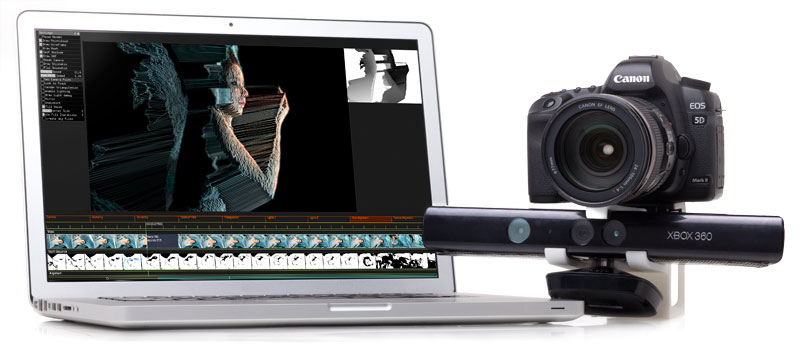Archive for the ‘technology’ category
Introducing the Moog Polyphonic Theremin
RGBDToolkit

The RGBDToolkit invites you to imagine the future of filmmaking.
Repurposing the depth sensing camera from the Microsoft Kinect or Asus Xtion Pro as an accessory to your HD DSLR camera, the open source hardware and software captures and visualizes the world as mesmerizing wireframe forms. A CGI and video hybrid, the data can be rephotographed from any angle in post.
IBM Centennial Film: 100 X 100 - A century of achievements that have changed the world
Amber Case - Prosthetic Culture
Amber Case
Cyborg Anthropologist
Amber Case is just your ordinary cyborg anthropologist. “My father used to read me bedtime stories out of this book called Evolution of Consciousness,” Case says. One night he drew two points on a piece of paper. He asked what the shortest distance was from point A to point B. “A straight line,” she said. “There’s an even shorter distance,” he responded. And he folded the paper over so the two points touched — “which is the idea of a worm hole. Compressed time and space,” Case says. “He told me this when I was 4 or 5, and I would think about it every single night.”
Today Case, just 23, has her own tech consultancy, mind-bending augmented-reality projects you wish you could understand, and a full schedule of speaking appearances, including the MIT Futures of Entertainment conference. And she still thinks about worm holes. “When you get really deep into anthropology, it studies space and time compression. Technology is now compressing point A and point B, that space between people.”
A self-proclaimed math and science nerd growing up, Case decided at Lewis & Clark College in Portland, Oregon, that the one thing she didn’t quite understand was people. This led her to sociology and anthropology classes, and after hearing a lecture on cyborg anthropology — the study of human and technology evolutions and interactions — she knew she had found the perfect fit. She wrote her thesis on cell phones. Before graduating in May 2008, she set herself the challenge of speaking at her first conference within five months. And she did — at the Inverge Conference in Portland that September. How did she do it? She walked right up and asked. The conference organizer was so impressed by her guts, he put her on the bill to talk about the evolution of the telephone and modern communication, and how Twitter changed it all. “If you set these obnoxious, absurd goals,” says Case, “they end up working out.”
Over the past two years, Case has been building a cult following of tech insiders. Kris Krug, a technologist who first met Amber at one such conference, is a fan of the highest kind. “Anyone who wishes to sell devices, or understand how we use them, they’re all going to be talking with her because she’s a whole level past where normal people are,” says Krug, a Vancouver-based Web strategist and author of Bit Torrent for Dummies. “She’s a digital philosopher of the bad-ass variety.”
“Digital philosopher” feels like the right term for Case as she discusses virtual selves, anthropomorphized smartphones, and the way our technology devices have become remote controls for our own reality. “Bad-ass” isn’t far off either. When she’s not doing cyborg anthropology research, speaking at conferences, or helping clients such as the VC firm Ignition Partners groom their virtual presence, Case is thinking about invisible interfaces and working with her friend Aaron Parecki on augmented-reality pet projects. “I have a GPS I carry around with me that color codes where I’ve been at different times of day, so it makes a color trail,” Case says. She then aggregates the color data to see where she spends the greatest amount of time. You know, for fun.
“She’s a digital native,” Krug says. “She’s from the future. She’s, like, come back to help us figure out how to think.” –Lily Cunningham
http://www.fastcompany.com/article/amber-case-digital-philosopher
Copyright © _dreams. All rights reserved.


